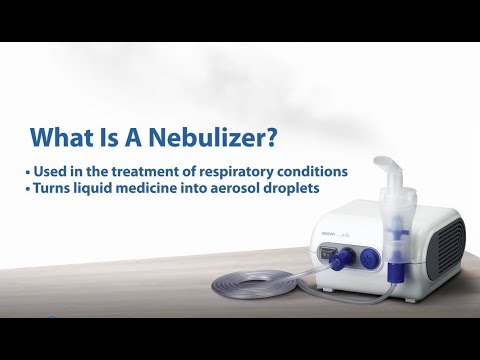Benefits of a Nebulizer
In this article, we will explore the numerous benefits of using a nebulizer for respiratory treatments. Nebulizers are medical devices that convert liquid medication into a fine mist, allowing it to be inhaled directly into the lungs. They are commonly used to treat respiratory conditions such as asthma, chronic obstructive pulmonary disease (COPD), and cystic fibrosis.
Improved Medication Delivery
One of the key advantages of using a nebulizer is its ability to deliver medication directly to the lungs. Unlike other forms of medication administration, such as oral tablets or inhalers, nebulizers ensure that the medication reaches the target area efficiently. The mist generated by the nebulizer allows for deeper penetration into the respiratory system, providing quick relief and better drug absorption.
Effective Treatment for Respiratory Conditions
Nebulizers are highly effective in managing a wide range of respiratory conditions. They can be used to relieve symptoms during acute episodes, as well as for long-term maintenance therapy. The fine mist produced by the nebulizer helps to open up airways, reduce inflammation, and alleviate breathing difficulties. This makes them particularly beneficial for individuals with conditions such as asthma, where prompt and effective medication delivery is crucial.
Increased Convenience and Ease of Use
Using a nebulizer is generally considered to be more convenient and easier than other methods of delivering respiratory medications. The device is simple to operate, requiring minimal effort on the part of the user. It is especially advantageous for young children, elderly individuals, or those with limited dexterity. Nebulizers are also portable, allowing users to carry them wherever they go, ensuring access to medication when needed.
Customizable Treatment Options
Nebulizers offer a range of customizable treatment options to suit individual needs. Different medications can be used in the nebulizer, depending on the specific respiratory condition being treated. Additionally, the device allows for adjustable dosage levels, ensuring that the right amount of medication is delivered. This flexibility makes nebulizers a versatile choice for healthcare professionals, allowing them to tailor treatment plans to each patient’s requirements.
Reduced Side Effects
Compared to other forms of medication administration, nebulizers often result in fewer side effects. This is because the medication is delivered directly to the lungs, minimizing its systemic absorption and reducing the risk of adverse reactions. Additionally, nebulizers can be used with smaller doses of medication, further minimizing the potential for side effects. This makes nebulizers a safer option for individuals who may be more sensitive to certain medications.

In summary, nebulizers offer numerous benefits for individuals with respiratory conditions. They provide improved medication delivery, effective treatment, increased convenience, customizable options, and reduced side effects. If you or a loved one is dealing with a respiratory condition, considering a nebulizer as part of your treatment plan may prove to be highly beneficial. Consult with your healthcare provider to determine if a nebulizer is the right choice for you.
Frequently Asked Questions about the Benefits of a Nebulizer
1. What is a nebulizer?
A nebulizer is a medical device that converts liquid medication into a fine mist that can be inhaled directly into the lungs.
2. How does a nebulizer work?
A nebulizer works by using compressed air or ultrasonic vibrations to break down the liquid medication into tiny particles, allowing it to be easily inhaled into the respiratory system.
3. What are the benefits of using a nebulizer?
The benefits of using a nebulizer include delivering medication directly to the lungs, providing fast relief for respiratory conditions, and being easy to use, especially for children and older adults.
4. Who can benefit from using a nebulizer?
Individuals with respiratory conditions such as asthma, chronic obstructive pulmonary disease (COPD), cystic fibrosis, and bronchitis can benefit from using a nebulizer to manage their symptoms.
5. Are there any advantages of using a nebulizer over other inhalation devices?
Yes, nebulizers are advantageous for individuals who have difficulty using inhalers or require higher doses of medication, as they deliver the medication in a mist form that can be inhaled more easily.
6. Can nebulizers be used for both children and adults?
Yes, nebulizers can be used by both children and adults. They are often preferred for young children or individuals who have difficulty using inhalers properly.
7. What types of medications can be used with a nebulizer?
A wide range of medications can be used with a nebulizer, including bronchodilators, corticosteroids, antibiotics, and mucolytics, depending on the specific respiratory condition being treated.
8. Are there any side effects of using a nebulizer?
Side effects of using a nebulizer are generally rare, but they can include throat irritation, hoarseness, increased heart rate, and tremors. It is important to follow the instructions provided by your healthcare provider.
9. How often should a nebulizer be used?
The frequency of nebulizer use depends on the individual’s condition and the prescribed medication. It is typically recommended to use a nebulizer as directed by your healthcare provider, which may vary from once a day to several times a day.
10. Are nebulizers covered by insurance?
Many insurance plans cover the cost of nebulizers and related medications, but coverage may vary. It is advisable to check with your insurance provider to determine the specific coverage details.




